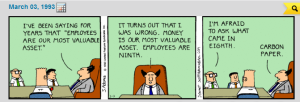“People are our greatest asset.”
Five words that are the most meaningless in the corporate lexicon. In watching a business channel, the other night, I heard it again. When I looked up, it was some big shot CEO mouthing off about “his people.”
My favorite past time as I travel 3 weeks out of the month, is to turn on CNBC or one of the business channels. Then I engage in “key word listening.” That is, any word around the intersection of human capital and the organization. When I hear a word or phrase, I generally look up to gauge the situation and, depending upon the context, either will stop multi-tasking or continue on.
For some reason, this time I listened, and as usual it was followed by incoherent statements about mission, core values, etc., etc.
Show Me How!
For once I would love to be a reporter. My follow-up question would be: “Can you tell our audience how your company lives up to that phrase. Give us some examples of what your company does to give your employees the feeling that they are those prized assets that you speak of?
I am chuckling as I write this because I know the “deer in the headlights look” and it would be plastered on the face of the person being interviewed.
Employees As Customers
I often marvel how much attention organizations pay to their customers. They can learn a lot about treating their employees by considering how they think about and treat their consumers. If we saw our people as if they were our consumers we would not have to depend on the outdated concept of engagement surveys. Think about it: We wait a year or maybe two to get this survey done and for the most part, nothing changes. Even performance reviews today are being challenged based on that old concept of once a year.
This outdated concept is supposed to give us insight into that important asset for a certain period of time. We spend time agonizing over the questions to add. We struggle deciding if it is the right time. I had one company tell me they would not go forward as there were layoffs recently. So, based on that logic, we would only run the survey when everything is perfect. A word to the wise, the best time to ask someone, “How am I doing as it relates to you” is when there are challenges. That way it is raw data that you are getting.
Then we coax and plead with our people to fill out the survey. Finally we get the results and do not respond to what it tells us. But don’t fret; all companies get the same results: no trust in leadership, better communication, favoritism, clueless leadership. And the beat goes on.
How You Treat Your Greatest Asset
But if people really were your greatest asset, would they be treated that way? Better still, what would happen if your customer survey gave you the same results. That would be catastrophic. All hands on deck and — drum roll — maybe an off-site.
Richard Branson said, “Clients do not come first, Employees come first. If you take care of your employees, they will take care of their clients.” That’s the point of a book by Vineet Nayar, Employees First, Customer Second, which awed me when it came out a few years ago. My good friend whom I’ve quoted numerous times, Peter Makowski, CEO of American Hospital in Dubai says, “We take care of the people who take care of the people.”
There is a common thread that runs through all these statements. Your people are your most important asset. Talent will become the big competitive advantage as we continue this climb into VUCA at warp speed.
Meaningless Words
Meaningless words on a website are a dime a dozen. I have often said if you must employ a wordsmith to craft your message, you have already failed.
My advice to the ivory tower: Those words on your website or the ones that you spew out from time to time, should mean something. If people really are your greatest asset, why not spend some time in your meetings that addresses those key points each and every time you get together?
You are correct, they are your greatest asset, but you just have not figured it out yet. Please do before it is too late.
